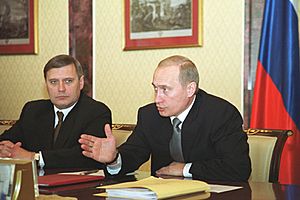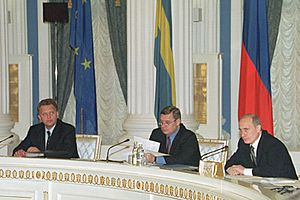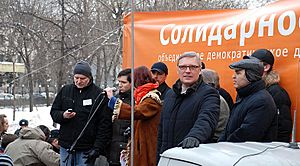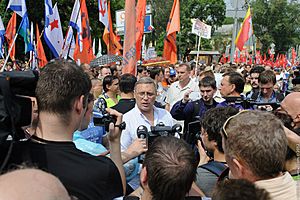Mikhail Kasyanov facts for kids
Quick facts for kids
Mikhail Kasyanov
|
|
|---|---|
|
Михаил Касьянов
|
|
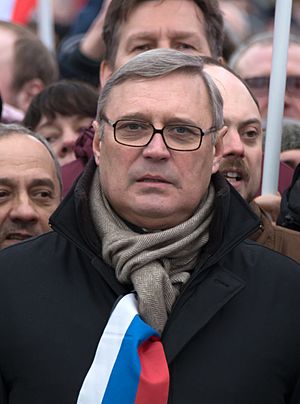
Kasyanov in 2015
|
|
| Prime Minister of Russia | |
| In office 7 May 2000 – 24 February 2004 (acting until 17 May 2000) |
|
| President | Vladimir Putin |
| Preceded by | Vladimir Putin |
| Succeeded by | Mikhail Fradkov |
| First Deputy Prime Minister of Russia | |
| In office 10 January 2000 – 17 May 2000 |
|
| Prime Minister | Vladimir Putin |
| Preceded by | Viktor Khristenko |
| Succeeded by | Dmitry Medvedev (2005) |
| Minister of Finance | |
| In office 25 May 1999 – 18 May 2000 |
|
| President | Boris Yeltsin Vladimir Putin (acting) |
| Prime Minister | Sergei Stepashin Vladimir Putin Himself (acting) |
| Preceded by | Mikhail Zadornov |
| Succeeded by | Alexei Kudrin |
| Personal details | |
| Born |
Mikhail Mikhailovich Kasyanov
8 December 1957 Solntsevo, Russian SFSR, Soviet Union |
| Political party | Independent (2000–2006) People's Democratic Union (2006–2010) People's Freedom Party "For Russia." (2010–2012) People's Freedom Party (2012–2023) |
| Spouse | Irina Kasyanova |
| Children | Natalia Alexandra |
| Occupation | Politician, businessman |
Mikhail Mikhailovich Kasyanov (born 8 December 1957) is a Russian politician. He served as the Prime Minister of Russia from 2000 to 2004. Before that, he was the First Deputy Prime Minister in 2000. He also worked as the Minister of Finance from 1999 to 2000. In the 1990s, he held various roles in President Boris Yeltsin's government. Later, he joined President Vladimir Putin's first government.
After leaving the government in 2004, Kasyanov became a strong critic of President Putin. He is now a leader in the Russian opposition. In 2008, he tried to run for President of Russia. However, he was not allowed to participate in the election. In 2010, he helped start the People's Freedom Party "For Russia without Lawlessness and Corruption" and became one of its leaders. He was also active in protests for fair elections in Russia between 2011 and 2013. Since 2015, he has led the People's Freedom Party (PARNAS).
Contents
Early Life and Education
Mikhail Kasyanov was born on 8 December 1957, near Moscow. His father was a math teacher and a school headmaster. He also fought in the Second World War. Kasyanov's mother was an economist.
As a child, Mikhail studied music and played the cello. In high school, he played in a rock band. In 1974, he started studying at the Moscow Automobile and Road Construction University. From 1976 to 1978, he served in the Soviet Army. He was part of the guard of honour at the Office of the Commandant of Moscow. This is now the Kremlin Regiment.
After his army service, from 1978 to 1981, he worked as a technician and engineer. He was at a scientific institute for the State Committee for Construction of the USSR. He finished his university studies in 1981. For nine years after graduating, Kasyanov worked at the State Planning Committee. He held roles like engineer, economist, and chief of sector. In 1987, he received a diploma from advanced economy courses at GosPlan.
Political Career
Working in the Ministry of Economy (1990–1993)
From 1990 to 1993, Kasyanov worked in the State Committee of Economy of the Russian Federation. Later, he moved to the Ministry of Economy. In 1993, the Minister of Finance, Boris Fyodorov, invited Kasyanov to join the Ministry of Finance. He became the head of the Foreign Loans and External Debt Department.
Becoming Minister of Finance (1995–2000)
In 1995, Kasyanov became the Deputy Minister of Finance. His job involved managing Russia's foreign debts. These were debts from the Soviet era, totaling about $150 billion. In 1996, he made agreements with groups of countries and banks that had lent money to Russia. These agreements helped Russia manage its debts over 25 years. This allowed Russia to get new loans from other countries. For the first time since 1913, Russia was able to sell special bonds in Europe and the United States. This helped Russian banks and companies get money for investments.
When financial problems hit Asia in 1997 and Russia in 1998, Russia could not pay its debts. The Russian currency, the ruble, lost a lot of its value. Kasyanov led the team that worked to fix these debt problems. He also talked with the International Monetary Fund (IMF) to get help for Russia. Because of his efforts, the ruble became stable again. This helped reduce rising prices and brought back production in Russia. People called him "the main financial diplomat of the country" because he was good at these negotiations.
In February 1999, he became the First Deputy Minister of Finance. In May 1999, President Yeltsin made Kasyanov the Minister of Finance. In June 1999, he also joined the Security Council of Russia. As Finance Minister, Kasyanov focused on the country's budget. During his time, Russia had its first budget without a deficit (meaning it spent less than it earned). In July, Russia received its first loan from the IMF after the crisis.
Kasyanov kept his job as Finance Minister when Vladimir Putin became Prime Minister. He continued to work on Russia's debts. Even with the Second Chechen War, he managed to solve the main debt problems within a few months. This helped Russia's economy grow. Because of careful financial policies, the government was able to pay salaries and pensions on time again. On 10 January 2000, Kasyanov became the First Vice Premier of the Russian government. He was still the head of the Ministry of Finance.
Serving as Prime Minister (2000–2004)
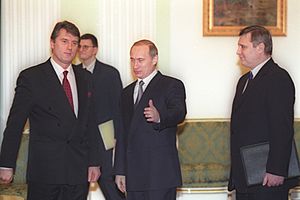
On 17 May 2000, the Russian State Duma approved Mikhail Kasyanov as Prime Minister. As Prime Minister, he worked closely with businesses and citizens.
During his four years in office, Kasyanov's government made many important changes. These included reforms to taxes and the budget. They also made it easier for money to move in and out of the country. They changed customs rules and reformed pensions. They also created a market for land. These changes helped Russia's economy grow steadily. Prices did not rise as much, and the economy and people's incomes grew by a third. This happened even when oil prices were not very high.
Many experts believe the tax reform from 2000 to 2002 was one of his government's biggest successes. A flat income tax rate of 13% was introduced. Many other taxes were removed. The VAT was lowered to 18%, and social taxes to 26%. These changes helped the government collect more money.
In 2003, Kasyanov's government also changed how the oil sector was taxed. They created a special Stabilization fund. This fund collected a lot of foreign money, creating a financial safety net for the country. It was a time of overall financial freedom.
Another important achievement was helping small businesses. They made it easier to start a business and reduced government inspections. During Kasyanov's time as Prime Minister, agricultural lands began to be transferred to private property. Also, farmers received more financial support. Russia quickly became a leading exporter of grain again. This was after many years of importing a lot of wheat.
President Vladimir Putin dismissed Kasyanov and his entire government on 24 February 2004. This happened after more than three years in office. It was two weeks before the 2004 Russian presidential election. There were disagreements between Kasyanov and Putin about government policies. Putin said his decision was about the future direction of the country.
Political Activity After Leaving Government
Becoming an Opposition Figure (2004–2008)
On 24 February 2005, a year after he was dismissed, Kasyanov said he might run for president in the 2008 elections. In April 2006, he became the Chairman of the People's Democratic Union (PDU). This was a new non-governmental organization. The PDU was part of a group called "The Other Russia." Kasyanov and the PDU took part in "Dissenters' Marches" in Moscow and St. Petersburg. These were some of the first public protests in many years. On 3 March 2007, Kasyanov spoke against Putin's government at a march in St. Petersburg.
In June 2006, Kasyanov criticized Putin's government. He said that the government and parliament could not work without daily instructions. He also said that independent TV no longer existed at the national level. In June 2007, the PDU nominated Kasyanov as a candidate for the presidential elections. In September 2007, a new political party called "People for Democracy and Justice" was formed. Kasyanov was elected its chairman.
Dispute Over a Property (2005–2007)
In July 2005, there was a public discussion about a former state dacha (a country house) called Sosnovka-1. It was said that Kasyanov had bought this property at a lower price in 2003. The Prosecutor General's Office started looking into the matter. Kasyanov stated that the claims were part of a plan to harm his reputation. He said he would continue to work for a real political process in Russia.
On 11 July 2005, the Russian Office of Public Prosecutor began investigating the sale of two houses. A court decision on 16 March 2007, stated that Kasyanov should return one house and pay money for using it. Kasyanov planned to appeal this decision.
Later, in 2006, a court recognized Kasyanov as a rightful buyer of Sosnovka-1. It refused to return the property to the state. However, new claims were filed. In 2007, by another court decision, the dacha was returned to state ownership.
Presidential Candidacy (2008)
In 2006, Kasyanov said he wanted to create a new political party and run for president in 2008. He left the opposition group The Other Russia in July 2007. This was because the group could not agree on one presidential candidate.
Kasyanov formed the Russian Popular Democratic Union party. However, the government agency that registers parties stopped it from taking part in the 2007 Russian legislative election. On 8 December 2007, Kasyanov confirmed he would run for president. His party nominated him as their candidate.
On 16 January 2008, he announced he had collected the 2 million signatures needed to run. But later that month, the Central Election Commission rejected his candidacy. They said that many of the signatures were not valid. Kasyanov appealed this decision, but the Supreme Court rejected his appeal.
Kasyanov said that the decision to stop him from running was made by Putin himself. He called the elections a "farce" and asked people to boycott them.
Writing a Book (2009)
Kasyanov wrote a book called Without Putin. The presentation of his book in Kyiv, Ukraine, on 18 December 2009, was canceled just minutes before it was supposed to start. His press secretary said the electricity went out at the hotel. Also, about 20 young men blocked the entrance to stop people from coming in.
Recent Activities and Opposition (2016–Present)
In February 2016, an image of Kasyanov was posted online by Chechen leader Ramzan Kadyrov. The image showed Kasyanov in the crosshairs of a sniper rifle. This was seen as a threat. On 10 February, Kasyanov was attacked in a Moscow restaurant by a group of men. They shouted threats at him.
Kasyanov has spoken out against the Russian invasion of Ukraine. In May 2022, he took part in a forum in Vilnius, Lithuania. The forum aimed to discuss how to change Russia's political situation. In June 2022, Kasyanov said he had temporarily left Russia. As of July 2025, he is in Riga, Latvia. In November 2023, Russia's Justice Ministry added him to a list of "foreign agents."
Images for kids
-
Kasyanov at an opposition meeting with Boris Nemtsov, Vladimir Milov, Vladimir Ryzhkov and Ilya Yashin on 9 October 2010
-
Kasyanov takes part in a march in memory of assassinated opposition politician Boris Nemtsov in Moscow, 1 March 2015
See also
 In Spanish: Mijaíl Kasiánov para niños
In Spanish: Mijaíl Kasiánov para niños
- Mikhail Kasyanov's Cabinet
 | Leon Lynch |
 | Milton P. Webster |
 | Ferdinand Smith |


